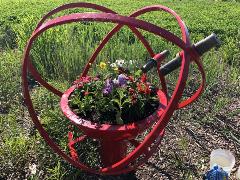How can we foster the next generation of conservationists if children never experience the outdoors? That's the question members of the League's Brown County Chapter in Wisconsin asked themselves several years ago.
The chapter is located just outside the city of Green Bay – home to paper mills, agriculture and food processing, meatpacking plants (that's how the Packers football team got its name!), and a port that feeds into Lake Michigan. With a 100-acre nature preserve, the chapter has an incredible opportunity to offer urban families a space to connect with nature and enjoy unstructured play.
So the chapter developed a master plan to engage youth and families in the outdoors. The plan included construction of a nature playground, bee and butterfly maze garden, and sensory garden – collectively called the "natural play area." As with most projects undertaken by a League chapter, the Brown County Chapter needed funding to make the natural play area a reality. When exploring funding options, chapter leaders determined that the IWLA Endowment was a valuable potential resource. Chapter leaders applied for and received a grant from the Endowment in 2017 to support development of the natural play area.
Chapter members designed the natural play area to teach children about the importance of clean water, clean air, pollinators, native plants, and wildlife habitat conservation. The playground features natural components that allow children to connect with the outdoors and explore nature in a fun and creative way, including a boulder climbing wall, sand pit, log sluice, wading pond, peace labyrinth, balancing logs, and grass play berms.

A two-acre pollinator garden was designed as a maze for children and their families to explore and learn about the vital importance of bees and butterflies to the environment. The pollinator garden features native plants, grasses, and shrubs that support many pollinators, including bees, birds, butterflies, and other insects. Chapter members installed interpretive signs and educational kiosks that convey the importance of pollinators and native plants. The pollinator garden also includes a botanical kaleidoscope (pictured right) that allows children to view plants and wildflowers up close in a very entertaining way.
Over the years, Brown County Chapter members have worked hard to connect disabled youth and adults with nature, so it was important to them to include a sensory garden that would allow children with disabilities to fully explore and appreciate nature. The sensory garden includes plants in different colors and textures, edible fruits, and herbs. Chapter members constructed musical instruments from natural elements (e.g., bamboo) and purchased others, including a whale drum made out of recycled steel that is specifically designed to engage autistic children and children with hearing difficulties.
Thanks to the grant from the IWLA Endowment, the chapter was able to build its natural play area to engage youth and families in the outdoors, which also helped raise the chapter’s visibility in the community.
If you would like to contact a member of the Brown County Chapter to ask about the natural play area, email Jodi Labs at jodi@lcojlaw.com.
Support more of this work